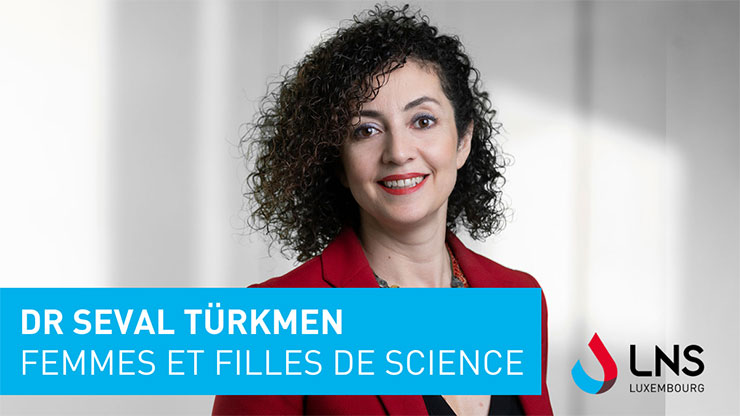- The Laboratory
- Organization
- Departments
- Jobs
- Analysis book
- Contact
- News
- Publications
- Download



Within the framework of the International Day of Women and Girls in Science, we have the pleasure to present you representatives of this female excellence at the LNS, who give us an insight into their work in the following three interviews, telling us what is particularly important to them in their field and how they see the role of women in science. Here the profile of Dr Seval Türkmen, in charge of the Haemato-oncogenetics Unit at the National Center of Genetics (NCG) of the Laboratoire national de santé.
I have been at the LNS since November 2019. Before that, I worked at the Charité hospital in Berlin for 20 years. I was born in Turkey and moved to Germany after graduating in medicine in Izmir without speaking German. I first learnt the language and then started working at Charité as a visiting doctor and then as an assistant doctor. Five years later, I became head of the department of tumour cytogenetics. Charité was my first workplace and I remained loyal to it for a long time. Twenty years in, however, I started looking for new challenges. I had received job offers on numerous occasions over the years, with an initial idea to go to Switzerland, but I then set my sights on the Laboratoire national de santé in Luxembourg. The modern diagnostics and the good research opportunities made the institute a very attractive place for me to work.
I have been head of the Haemato-oncogenetics Unit here for two years now. The field of haemato-oncology deals with benign and malignant diseases of the blood, carcinomas of the lymph nodes and the lymphatic system as well as malignant solid tumours. My unit primarily performs genetic diagnostics for leukaemia and lymphoma. In patients with suspected blood cancer, we can detect chromosomal changes through targeted genetic examinations, which contribute to the diagnosis and determine the prognosis and severity of the disease. Our findings subsequently also serve as a guide for treatment and help doctors to use “targeted” therapies. After diagnosis, these genetic tests also allow monitoring of therapeutic response and detection of resistance mechanisms during follow-up. For leukaemia and lymphoma patients, this is the gold standard of diagnostic and therapeutic procedures.
My interest in oncology actually stems from personal experience: I was five years old when my father developed cancer. On the way to the operating theatre, he said to me: “Become a doctor and do research on cancer!” I was 13 when my father succumbed to the disease. From that came my desire to do research and work with cancer patients. Since then, I have been driven by the desire to understand the molecular mechanisms of the disease in order to be able to offer better treatment options – for cancer and other diseases. During my time at Charité, I did a lot of research on the topic of rare diseases and congenital syndromes and also published numerous papers on this topic. I think these are very exciting areas of science. Why do these people fall ill? Going in search of the causes is fascinating, like pieces of a puzzle to put together. And if you find answers, it is possible to offer prenatal diagnostics and, in rare cases, to develop therapies and use them early on, before the disease progresses.
I’ve only been at the LNS for two years and I’m still setting up the unit, standardising protocols and recruiting staff. My top priority is to deliver good diagnostics first. However, in the near future, from 2023, I would also like to establish research projects at the LNS, for example on the topic of multiple myeloma, a cancer originating from the plasma cells of the bone marrow, on which I have done research before. I would like to continue this work at the LNS.
I have noticed that women are more ambitious overall. In most countries, unfortunately, the highest echelons of science are still dominated by men and as a woman you really have to do great things to climb the ladder. It is an uphill battle to the top where, in my experience, women have to put in more effort and sacrifice than their male counterparts to achieve the same goal. This results in their ambition and very effective self-management skills. I don’t want to be sexist, but I think it is still the case that more is expected of women in our society. She must fulfil several roles at the same time: She is supposed to be a good wife and mother and if she also wants to be a successful scientist, she has to put a lot of effort and energy into balancing everything. I know of a few examples of women scientists who found themselves in this situation during the Covid-19 pandemic.
I have excellent colleagues and I cannot say that women do research differently or better than men. But I think that we naturally ask more questions and for the reasons I have just mentioned, we are often more ambitious and determined, have very good organisational skills and an amazing ability to overcome difficulties. These qualities help them to progress in research. At the same time, women are not only success-oriented, but also harmony-oriented and know how to find a balance between these two requirements. Their way of communication creates a better working climate. I think we need more women in leadership positions, who take critical decisions, not only in science and research, but in all areas. Then our world would be more peaceful.